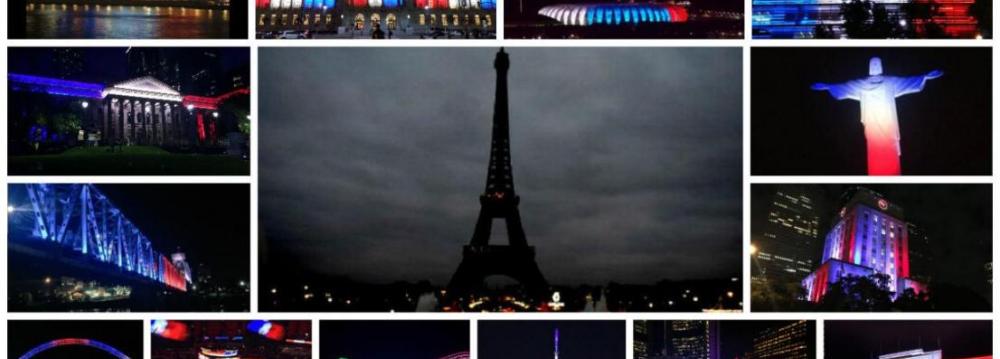The Eiffel Tower stood dark in a symbol of mourning Saturday night as France struggled to absorb the deadliest violence on its soil since World War II: coordinated gun-and-suicide bombing attacks across Paris that left at least 129 people dead and 352 injured.
President Francois Hollande vowed that France would wage “merciless” war on the Islamic State group, which claimed responsibility for the mayhem, as investigators raced to track down their accomplices and uncovered possible links to networks in Belgium and Syria.
Paris Prosecutor Francois Molins said three groups of attackers, including seven suicide bombers, carried out the “act of barbarism” that shattered a Parisian Friday night.
He said the attackers in the Bataclan concert hall, where 89 people died, mentioned Syria and Iraq during their rampage. Of the hundreds wounded in the six attacks, 99 were in critical condition, AP reported.
Seven attackers launched gun attacks at Paris cafes, detonated suicide bombs near France’s national stadium and killed hostages inside the concert venue during a show by an American rock band—an attack on the heart of the pulsing City of Light.
Late Saturday, a crowd of up to 250 people gathered for an impromptu candlelight vigil at the Place de la Republique, the site of a massive demonstration in the wake of the Charlie Hebdo killings earlier this year.
Hollande, who declared three days of national mourning and raised the nation’s security to its highest level, called the carnage “an act of war that was prepared, organized, planned from abroad with internal help”.
The president said France would increase its military efforts to crush IS. He said France, which is part of a US-led coalition bombing suspected IS targets in Syria and Iraq and also has troops fighting militants in Africa, “will be merciless toward the barbarians of IS group.”
IS claimed responsibility in an online statement in Arabic and French circulated by supporters. The statement called Paris “the capital of prostitution and obscenity” and mocked France’s air attacks on suspected IS targets in Syria and Iraq, saying France’s air power was “of no use to them in the streets and rotten alleys of Paris.”
Many of Paris’s top tourist attractions closed down on Saturday, including the Eiffel Tower, the Louvre Museum and the Disneyland theme park east of the capital. Some 3,000 troops were deployed to help restore order and reassure a frightened populace.
French Interior Minister Bernard Cazeneuve announced that all public demonstrations would be banned until Thursday and local governments throughout the country would have the option to impose nightly curfews.
Parisians expressed shock, disgust and defiance in equal measure. Some areas were quiet, but hundreds queued outside a hospital near the Bataclan concert hall to donate blood.
Authorities said seven attackers died, six in suicide bombings, a new terror tactic in France. Authorities said police shot the other assailant, exploding his suicide vest. Police have detained two relatives of the one attacker who has been identified so far, the prosecutor’s spokeswoman said.
Molins said one was identified from fingerprints as a French-born man with a criminal record. The 29-year-old Omar Ismail Mostefai was named by local media and a French parliamentarian. Investigators identified him after his severed fingertip was found at the Bataclan concert hall, where three attackers blew themselves up.
In addition, a Syrian passport found near the body of another attacker was linked to a man who entered the European Union through a Greek island last month.
If the attack does involve militants who traveled to Europe amid millions of refugees from the Middle East, the implications could be profound.
Poland’s prospective minister for European affairs, Konrad Szymanski, said that in light of the attacks, Poland would not comply with an EU plan to accept refugees unless it received “guarantees of security.”
The attack brought an immediate tightening of borders as Hollande declared a state of emergency and announced renewed border checks. Germany also stepped up border checks.
Video shot by Le Monde reporter Daniel Psenney from his balcony captured scenes of panic as people fled the Bataclan, some bloodied and limping, others dragging two bodies. Three people could be seen clinging to upper-floor balcony railings in a desperate bid to stay out of the line of fire.
The Paris carnage was the worst in a series of attacks claimed by IS in the past three days. On Thursday, twin suicide bombings in Beirut killed at least 43 people and wounded more than 200, and 26 people died Friday in Baghdad in a suicide blast and a roadside bombing that targeted Shias.
The militant group also said it bombed a Russian plane that crashed in Egypt’s Sinai Peninsula on Oct. 31, killing 224 people.
“The big question on everyone’s mind is: Were these attackers—if they turn out to be connected to one of the groups in Syria—were they homegrown terrorists or were they returning fighters?” said Brian Michael Jenkins, a terrorism expert.


